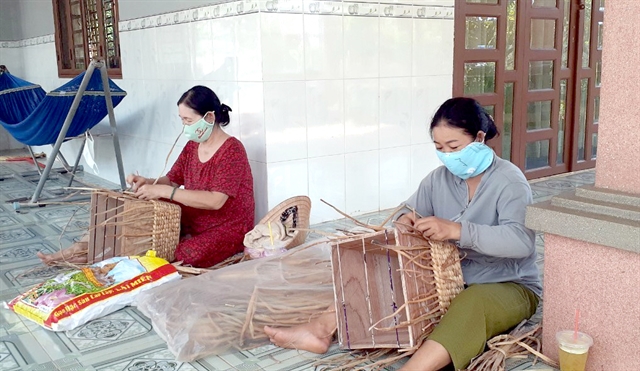 Society
Society

More rural workers in the southern province of Bà Rịa-Vũng Tàu have improved their income and enjoy stable lives after attending vocational skill courses organised by the province.

|
| Making products from water hyacinth products in Bà Rịa-Vũng Tàu Province’s Châu Đức District. — VNA/VNS Photo Hoàng Nhị |
BÀ RỊA-VŨNG TÀU — More rural workers in the southern province of Bà Rịa-Vũng Tàu have improved their income and enjoy stable lives after attending vocational skill courses organised by the province.
Đặng Thị Hòa of Châu Đức District’s Cù Bị Commune now earns VNĐ3 million (US$130) a month from making products from water hyacinth in her free time.
In 2012, she and 14 other women in the commune participated in a training programme organised by the province's Farmers Association and commune Women’s Union.
After the three-month course, they established the Cù Bị Commune Water Hyacinth Weaving Group to make household utensils from the aquatic plant like baskets and bags.
The group members make them in their free time when they do not have household or farming work to attend to.
Hòa said: “Previously, we did not know what to do to earn an additional income in our free time. Thanks to this weaving job, we have work to do and can improve our income.”
The Farmers Association has organised a number of water hyacinth weaving courses in rural areas in recent years since it can be done by anyone, irrespective of age.
The products are both sold domestically and exported.
The Farmers Association has also organised training in crop cultivation, animal husbandry and aquaculture for farmers, and these have helped farmers improve yields and quality of rice, black tiger shrimp, cattle, poultry, sour sop, longan, and grapefruit.
Nguyễn Văn Lâm in Phú Mỹ Town’s Hắc Dịch Ward said seven years ago he switched from cashew and rubber on his one hectare of land to green-skin and pink- flesh grapefruit, but lacked knowledge of appropriate farming techniques.
Last year, he participated in a training course and was taught techniques for fertilising, pruning branches, producing off-season fruits, treating diseases, and post- harvest preservation.
His 400 trees now grow well and produce around five tonnes of fruits a year, providing him with an income of VNĐ200 million ($8,600), he said.
After learning vocational skills, many farmers have joined co-operatives and co-operative groups to secure outlets.
The province now has many well-functioning co-operatives and co-operative groups like the Suối Rao Commune Freshwater Breeding Co-Operative in Châu Đức District and the Sông Xoài Commune Green-Skin and Pink-Flesh Grapefruit Co-Operative in Phú Mỹ Town.
Nguyễn Văn Vinh, deputy director of the Farmers Association’s Vocational Training and Farmer Support Centre, said after attending vocational skill courses, most trainees have created their own job.
The establishment of co-operatives and co-operative groups has improved the incomes of their members and stabilised their lives, he said.
The province has organised more than 4,000 training courses since 2011 attended by more than 22,000 people.
The Farmers Association plans to organise more in water hyacinth weaving, animal husbandry, organic farming, and hi-tech farming this year.
The People’s Committee has earmarked more than VNĐ7 billion ($302,000) for vocational training for rural people and those with disabilities this year. — VNS




